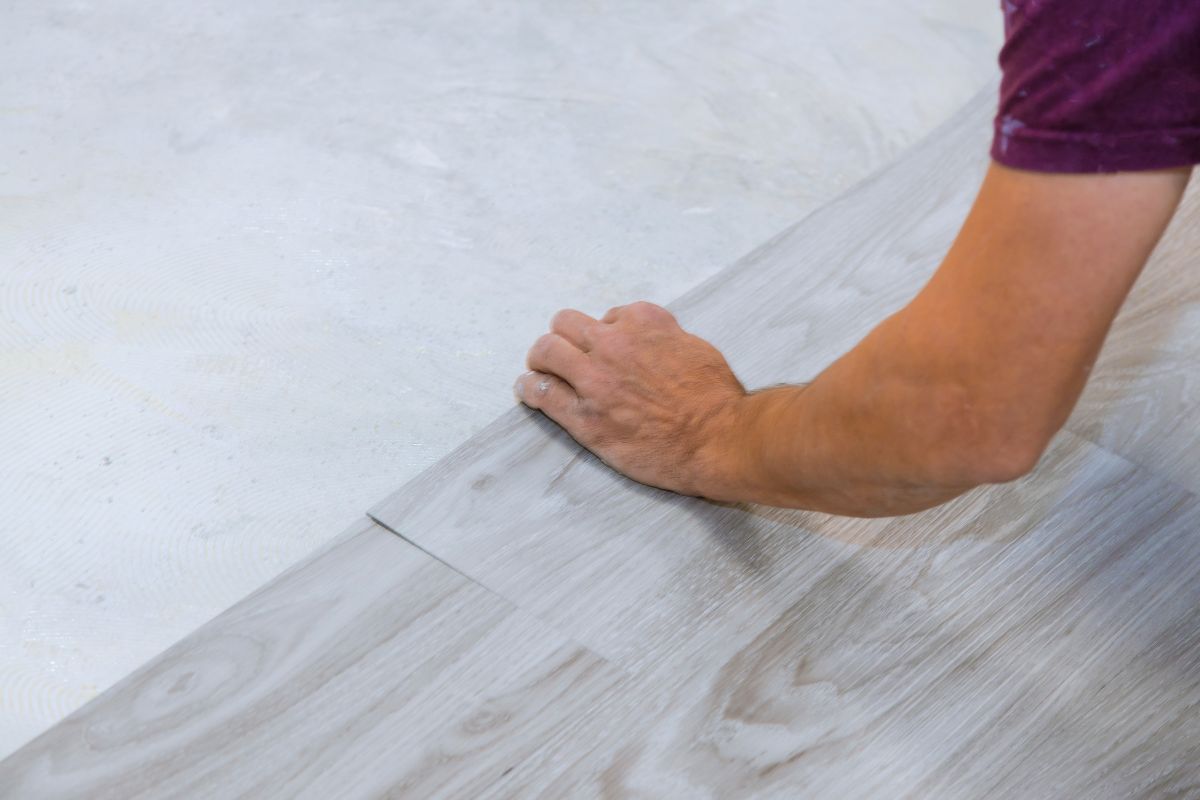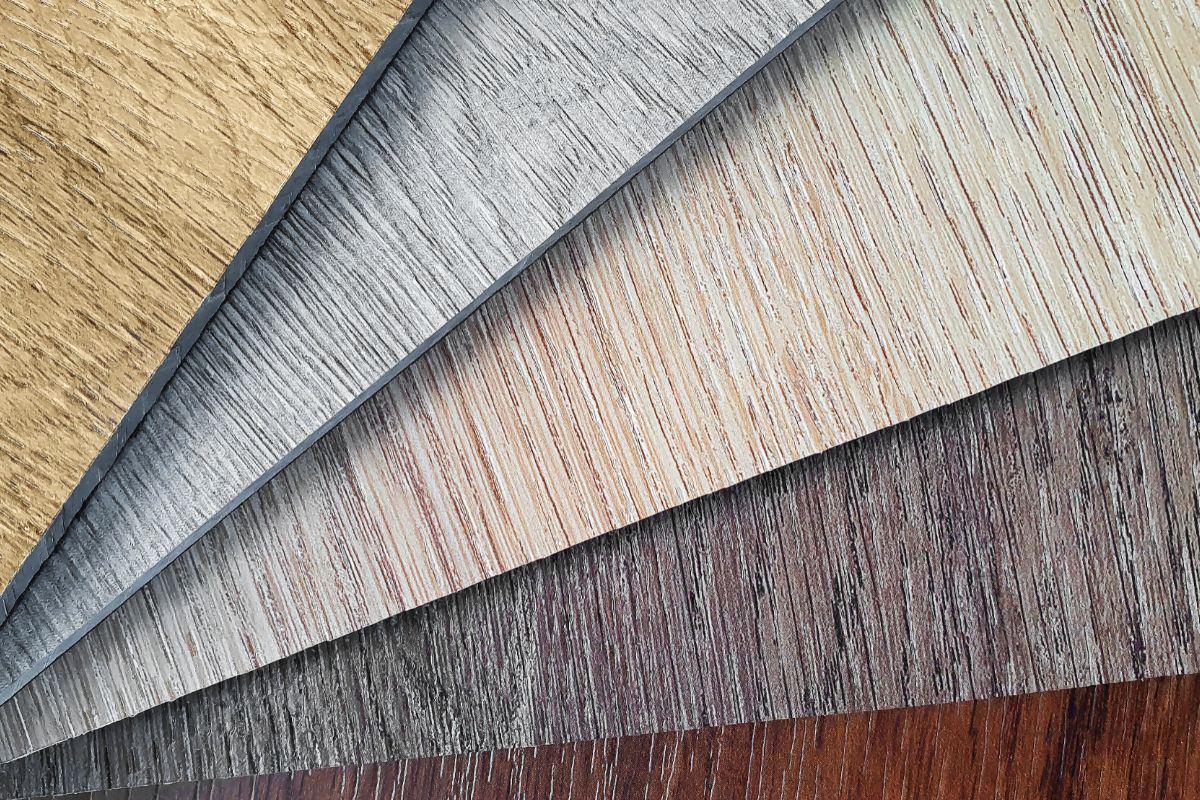When choosing flooring options, we are truly spoiled for choice these days.
Whilst this is overall a positive thing, having so many types of flooring to choose from can make it challenging when deciding which one you want or need.
From laminate flooring to carpets and hardwood flooring to tiles, picking the right one depends on your needs and taste.

One type, however, that has become more and more popular in recent years is vinyl flooring, particularly vinyl plank flooring.
When it comes to vinyl plank flooring, the confusion doesn’t end. There are so many acronyms, such as LVP, WTH, and WPC. But, what do these mean?
Well, we are going to discuss these different vinyl flooring in today’s post. You may conjure up images of a roll or sheet of flooring when thinking about vinyl.
The type that ripped easily if you caught it by accident or dropped something whilst making food.
Well, vinyl plank flooring has come a long way since early vinyl flooring and it is very different today.
Synthetic and man-made, today’s vinyl plank flooring is made to look natural and, best of all, it is usually cheaper than some other materials.
However, there are some disadvantages to using it.
To help you decide whether vinyl plank flooring is right for you, we have compiled this article to talk you through the pros and cons of using this type of flooring.
Therefore, you can make an informed decision on whether you want to install vinyl plank flooring or choose another material.
What Is LVP Flooring?
LVP is an acronym for Luxury Vinyl Plank and is the name for all vinyl flooring designed in a plank style.
This gives the illusion of wood floors but with the added benefit and features of vinyl material.
On occasions, you may hear the term LVT, as well, which is short for Luxury Vinyl Tile. This acronym covers all vinyl items that are made to look like stone or tile.
Generally speaking, LVP is used most often in the flooring industry, so, for the sake of today’s article, we will use it as the catch-all term.
Okay, so it’s time to get confused – all LVP is considered vinyl plank but not all vinyl plank is considered LVP. Let’s try and get our heads around this confusion!
Several layers make up LVP. These layers help to form a strong, durable type of flooring that is typically low maintenance.
The base layer is known as a “backer board.” This acts as a flexible base and is made from PVC to add stability.
The center layer in most LVPs is “water-resistant,” which shouldn’t be confused with being waterproof.
Nonetheless, this layer generally provides enough durability for the flooring to remain in good condition for longer.
Above the core layer is the “vinyl layer.” This is the material that is marked with the color and pattern of the material it is mimicking, such as stone or wood.
And, on the top is the most important layer – the “wear layer.” This clear, thin layer acts as protection against marks and scratches. It is also typically stain-resistant, too.
Thinner wear layers are usually installed in residential properties, whereas thicker wear layers are for commercial floors.
The thickness of the wear layer usually measures from 6 mm from its thin end to around 30 mm on its high end.
For residential or light commercial use, the layer thickness is normally under 12 mm. For commercial properties, the wear layer will tend to be 12 mm to 20 mm.
Compared to other vinyl flooring products, LVP is typically the most flexible.
Because it is glued to the ground, it is also one of the strongest and most durable, due to being fixed to the subfloor at all times.
Pros Of LVP Flooring
There are many advantages to using LVP flooring. Here are some of the main pros to consider:
It’s Affordable
In general, LVP flooring is pretty cheap and a cost-effective way of transforming a space.
Compared to traditional hardwood flooring, it is much cheaper but can still give the illusion of the real deal and offer great durability.
It’s Durable
There’s no doubt that LVP flooring is tough as nails. Because it has so many layers, it should last for many years. Moreover, top-quality LVP is dent, scratch, and scuff-resistant.
That is why it is suitable for heavy traffic areas of your home and in commercial environments.
It’s Stylish
If you want to mimic a particular style of material, LVP will almost certainly be able to please your tastes.
From wood to stone, LVP offers virtually infinite options when mimicking other, more expensive types of flooring. And, it can achieve the same patterns easily.
It’s Pretty Versatile
LVP material is surprisingly more water-resistant than its laminate counterpart. Therefore, it is perfect for installing in high-traffic areas of your home or office.
No more worrying about spills and stains that could be very costly on other types of flooring.
Cons Of LVP Flooring
Although there are some advantages to using LVP flooring, there are some cons to consider, too.
Can Fade Due To UV Exposure
If you spend a bit less on an LVP product, you may find that it is of lower quality. Therefore, it may feature thinner wear layers that are not resistant to UV rays.
If your room is open to natural lighting all day long, every day, the flooring may start to fade.
If exposed areas start to fade, you may not notice it as much, but when the time comes to rearrange furniture, it’ll be pretty easy to see where those items once stood.
It Can Be Pretty Smelly
During the installation process, LVP can come with an unwelcome scent. This is because it is typically glued to the subfloor. And, we all know how smelly glue can be.
The flooring can take quite some time to dry, so the smell of glue can linger. Also, if you want to replace the flooring in the future, it can be very difficult to replace the glue.
However, it is generally easier to replace one plank of LVP compared to WPC or SPC, which we will discuss further down.
It May Not Bring You A Great Return On Investment When Selling Your Home
Yes, LVP can look luxurious but, at the end of the day, it’s not the real deal. It may look like hardwood but it never will be.
Whilst this is not a bad thing, LVP will never get you the same return as true, solid hardwood flooring.
Not only that but you can refinish hardwood floors when required, whereas it is not possible with LVP.
What Is Rigid Core WPC/SPC Flooring?

In recent years, rigid core vinyl plank flooring has become one of the most popular types in homes and commercial settings.
Rigid core flooring can be made from either WPC or SPC. WPC stands for Wood-Plastic Composite or Wood-Polymer Core. SPC stands for Stone-Polymer Core.
Rigid core floors are generally designed to mimic standard hardwood flooring with the letters (either W or S) signifying the material that makes the core layer.
As with LVP, WPC/SPC rigid core flooring consists of layers. Together, these layers are suitable for residential and commercial buildings and can be used in both dry and wet settings.
The bottom layer of WPC/SPC consists of an under layer of cork or foam and is typically attached. This helps to add extra comfort as you walk, as well as some sound absorption.
Above this layer is the “core layer.” This is made from a composite of stone or wood powder, as well as resin or plastic.
Right above this is the “vinyl layer.” This is manufactured via digital technology where different colors and prints can be added and perfected to suit your tastes.
The top layer is the “wear layer.” Like LVP, this is scratch and wear-resistant. Remember when we said that LVP flooring is not waterproof?
Well, WPC and SPC are fully waterproof. Therefore, they can be installed in moist, wet areas for residential and commercial use.
The wood in its core will not ripple or swell when met with water, meaning improved longevity and durability.
Unlike LVP flooring, WPC and SPC are float-installed. This means that they are not fixed to the substrate permanently. So, no glue is required.
This type of flooring implements an interlocking system. They connect to each other, allowing the floor to seemingly glide above the subfloor below.
Thickness levels vary, with measurements of 5, 5.5, 6.5, and 8 mm being the most common in lighter applications. Moreover, lighter WPC flooring is also lighter on the wallet.
SPC vinyl flooring is also typically thinner. Its stone base core tends to allow for a stronger plank that sports a thinner profile, such as 3.2 mm to 7 mm, as opposed to 5 mm to 8 mm.
For the best feeling underfoot, thicker planks are the better option. These are also stronger and more durable. Even under a lot of foot traffic, they should hold up well over time.
However, the subfloor will usually need some sort of preparation before being installed.
And, if you have uneven subfloors, the added rigidity of WPC and SPC flooring makes them fantastic options.
With many colors and finishes available, rigid core WPC/SPC flooring can help you achieve that perfect look in your home.
Pros Of Rigid Core WPC/SPC Flooring
As with LVP flooring, rigid core WC and SPC flooring come with a host of advantages. Below are the main ones to consider.
Cost-Effective
As with LVP, WPC and SPC flooring provides durability at a cheaper price than real stone or hardwood floors.
Although a little more expensive than LVP, WPC and SPC flooring, they are cost-effective overall.
Easy To Install
Compared to other types of flooring, installing this type of rigid core material is a breeze.
It can also be tailored to suit your space more easily with the opportunity to even install it over existing flooring in some cases.
Can Mimic Most Materials
WPC and SPC vinyl flooring offers an almost limitless palette of color options, patterns, and grains.
Therefore, you should find it pretty easy to find flooring that looks just like other materials like stone, tile, or wood.
It’s Versatile
WPC/SPC vinyl flooring can be installed in moist and wet areas thanks to its waterproof properties.
Compared to other options, like laminate, WPC/SPC is the better option and sometimes the only option.
So, whether you need new flooring in your basement, kitchen, or bathroom, using WPC and SPC vinyl flooring can do the job perfectly.
It’s Tough
Like LVP, WPC/SPC flooring is very durable. In fact, it is arguably stronger than LVP material.
It is dent, scratch, and scuff resistant, meaning it can withstand heavy traffic in areas of your home for long periods of time.
Cons Of Rigid Core WPC/SPC Flooring
Of course, there are always two sides to a product. As well as the many advantages and benefits of using rigid core WPC/SPC flooring, there are a few cons to consider.
Here are a few.
It’s Not The Real Deal
Like LVP, WPC/SPC is not real hardwood, and never will be. Therefore, you cannot refinish it if you ever felt the need to.
And, if you ever want to sell your home, it may not be to someone’s taste, so you’re unlikely to make a great return on investment.
It May Not Be UV-Resistant
Some rigid core WPC/SPC flooring may not be UV-resistant.
Whilst most are, you need to double-check its true resistance, especially if it’s being installed in an area exposed to a lot of natural light.
Over time, you find that the flooring will fade, like LVP.
So, Is Vinyl Plank Flooring Worth It?
Vinyl plank flooring comes in varied colors and patterns. With so much to choose from, you will find something to suit your home’s design and style.
With different thickness labels and price options, you should be able to find something within your budget that is also long-lasting.
Typically cheaper than hardwood flooring, it is important to consider that you may not make any money back when selling your property in the future.
But, to achieve the hardwood look, vinyl plank flooring is affordable and attainable.
In Summary
We hope this guide has helped you decide whether vinyl plank flooring is right for you. Check out our other articles to find out more to help you on your home improvement journey.
- How To Drill Into Brick? - October 31, 2022
- How To Repair And Refinish Hardwood? - October 31, 2022
- Floetrol – What Is It? When To Use It: Complete Guide - October 31, 2022
